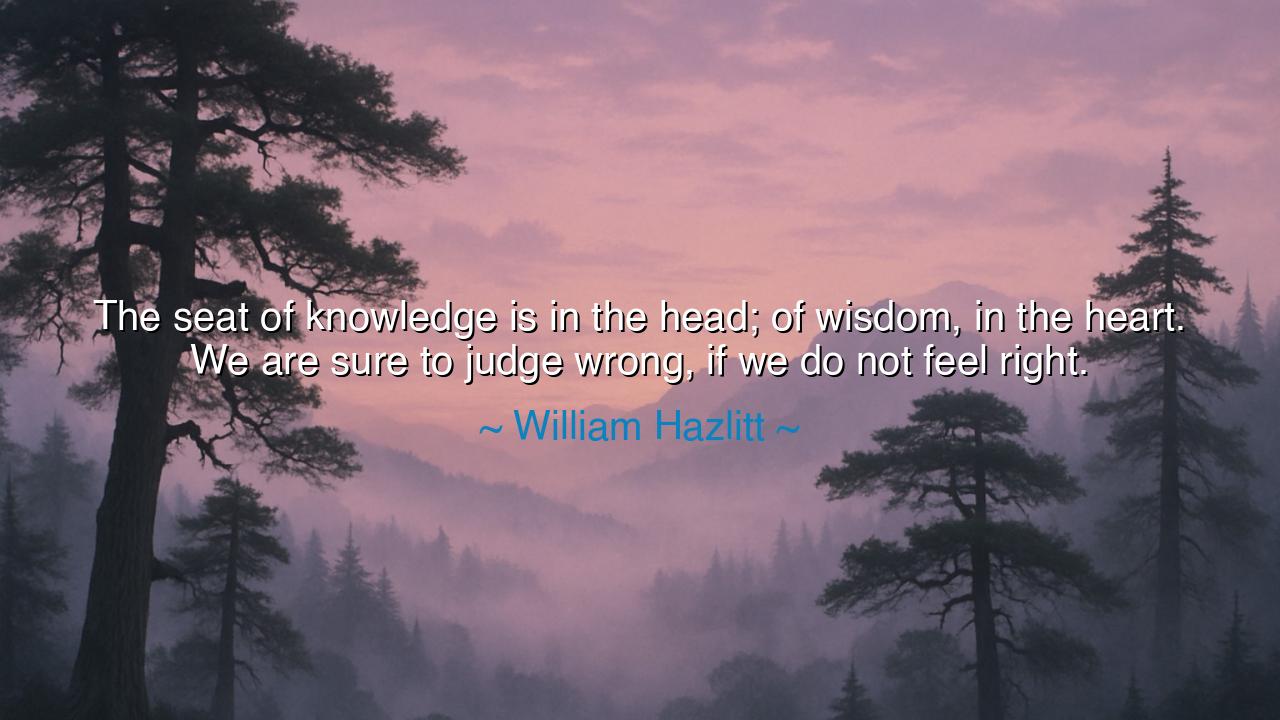
The seat of knowledge is in the head; of wisdom, in the heart.
The seat of knowledge is in the head; of wisdom, in the heart. We are sure to judge wrong, if we do not feel right.






William Hazlitt, sharp of mind and bold of pen, gives us this eternal counsel: “The seat of knowledge is in the head; of wisdom, in the heart. We are sure to judge wrong, if we do not feel right.” In these words he reveals the great divide between knowledge and wisdom. Knowledge is the gathering of facts, the labor of the mind; but wisdom is the art of living, born from the union of thought and compassion. Without the heart, the head grows cold; without feeling, judgment strays into cruelty and error.
The meaning is luminous. To know is not always to understand. A man may study the stars and number their courses, yet fail to see the beauty they declare. A ruler may memorize the laws of his land, yet oppress his people if he feels no pity. Hazlitt teaches that the heart must guide the head, for only when intellect is joined with moral sensibility does true wisdom arise. To think rightly, one must also feel rightly.
History offers us vivid proof in the life of Abraham Lincoln. He was no scholar in the manner of philosophers, yet his greatness lay in his union of mind and heart. He read widely, reasoned carefully, but above all, he felt deeply for the plight of the enslaved and the suffering of a nation torn in two. When he judged, it was not only with sharp intellect but with compassion, and thus his wisdom carried a healing power that mere knowledge alone could not give.
Contrast this with the cold reasoning of the French Revolution’s Reign of Terror. The leaders believed they possessed knowledge of justice, liberty, and equality, yet without the tempering of mercy, they descended into bloodshed. Their head was full, but their heart was empty, and so their judgments led not to freedom but to horror. Here we see Hazlitt’s warning: that to feel wrong is to judge wrong, even when reason appears sound.
Therefore, let us remember that the seat of wisdom is not only in what we know but in how we love. Let the head learn, but let the heart guide. For the mind alone may conquer worlds, but only the union of heart and mind can build them into homes of justice and peace. To walk in truth, then, is not merely to reason, but to feel rightly, and in this harmony lies the fullness of wisdom.






HNHien Nguyen
Hazlitt’s idea fascinates me because it implies that judgment is as much a moral act as an intellectual one. We often assume that rational decisions are superior, but maybe he’s right — that cold logic without feeling can lead to inhuman conclusions. Still, I wonder, can emotions mislead us just as easily? Perhaps the real challenge is discerning which feelings align with genuine wisdom.
DUChu Thi Duy Uyen
This statement feels deeply human to me. It reminds us that knowledge doesn’t automatically lead to understanding or kindness. We can know a lot but still make cruel or unjust decisions if our emotions aren’t grounded in empathy. But how do we ‘feel right’ in a world where emotions are so easily manipulated — by fear, anger, or bias? Maybe emotional wisdom requires just as much training as intellectual skill.
HNBui Hong Ngoc
I love how Hazlitt links wisdom to the heart. It makes me think about how often modern society prioritizes rationality and data over emotional intelligence. Do you think we’ve lost something by treating feelings as less reliable than logic? It’s interesting that judgment, in his view, depends on feeling rightly — as if moral truth can’t exist without a kind of emotional clarity.
TMnguyen thi thao my
This quote really captures the tension between intellect and emotion. It suggests that thinking alone isn’t enough — that wisdom requires empathy and moral feeling. I find that idea beautiful, but also challenging. Can feelings always be trusted to guide judgment? Emotions can cloud reason just as easily as reason can ignore compassion. Maybe true wisdom lies in balancing both heart and mind, rather than favoring one over the other.